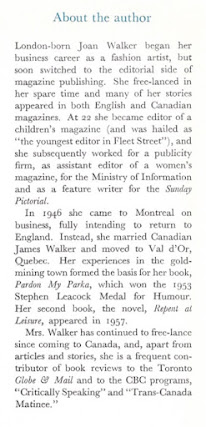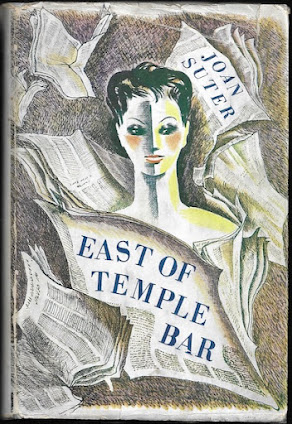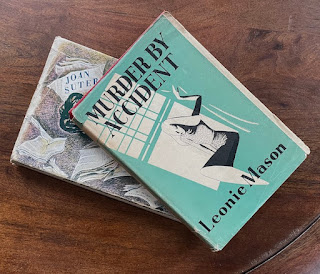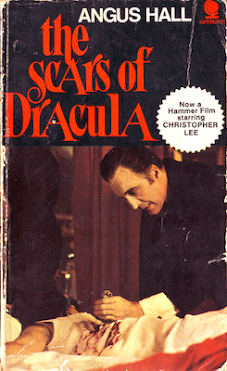I've got several paying projects on the go, all with tight deadlines, meaning there won't be any reviews here for the next month or so. Something to do with feeding the family, you understand.
However, I did want to share a few things about one of those paying projects: a review of Joan Suter's novel East of Temple Bar for my column in Canadian Notes & Queries.
Until this year, Joan Suter's name meant nothing to me; I encountered it while researching Joan Walker, whose 1957 novel Repent at Leisure I reviewed here in January. Not much has been written about Walker or her career; most of what has, jacket copy included, refers to Repent at Leisure as a debut novel.
 |
| Marriage of Harlequin Joan Walker Toronto: McClelland & Stewart, 1962 |
I have Daryn Wright and Karyn Huenemann to thank for setting me straight. Their Joan Walker entry at Canada's Early Women Writers brings the revelation that Repent at Leisure wasn't the author's first novel, or even the second, but the third. Published in 1946 under her maiden name, East of Temple Bar was Walker's true debut. The same year saw her follow-up, Murder by Accident, which appeared under the pseudonym "Leonie Mason."
Copies of East of Temple Bar aren't plentiful, but they are inexpensive. I wanted the dust jacket, so and splurged all of £7.50 on mine. Money well spent, it brought this front flap:
East of Temple Bar was published in London by C & J Temple. A fragile pale green hardcover with thin pages, its worthy of study by those interested in supply constraints faced by printers in post-war England. My copy, purchased online from London's Small Library Company, once belonged to British novelist Angus Hall (1932-2009). As he would have been thirteen or fourteen when it was published, I'm guessing Hall bought it used when he was a young Fleet Street journalist.
East of Temple Bar revolves around Eve Smith and Hugh Fenwick, two friends who meet while working on Fleet Street. Like Hugh, Angus Hall became a film and theatre critic. Like Eve, he eventually left Fleet Street for a life as a novelist.
Hall's first novel, Love in Smoky Regions, was published in 1962 by Constable. It appears to have been very well-received; just look at the TLS quote on the cover of this paperback edition:
The High-Bouncing Lover (Hammond, 1966) was his second novel. Apparently, it's about a failed writer. I can't help but note that The High-Bouncing Lover was one of the working titles for The Great Gatsby, Fitzgerald's first commercial failure.
By the time the 'seventies hit, Hall had made a reputation for himself as a horror writer. His 1969 novel Devilday was adapted to the screen as Madhouse (1974), starring Vincent Price.
And then there's this, which may frighten some readers:
I count sixteen titles in total, though it's hard to say for certain. Sadly, like Joan Walker (née Suter), Angus Hall is more or less forgotten. What remains of his personal library now rests with the Small Library Company. How it ended up there is an interesting story, told through this Abebooks podcast. One of the Company'a goals is "to find good homes for the books."
Angus Hall's copy of East of Temple Bar has found a good home on my Upper Canadian bookshelves. My only disappointment is that he didn't write his name in it.
Related posts:













No comments:
Post a Comment